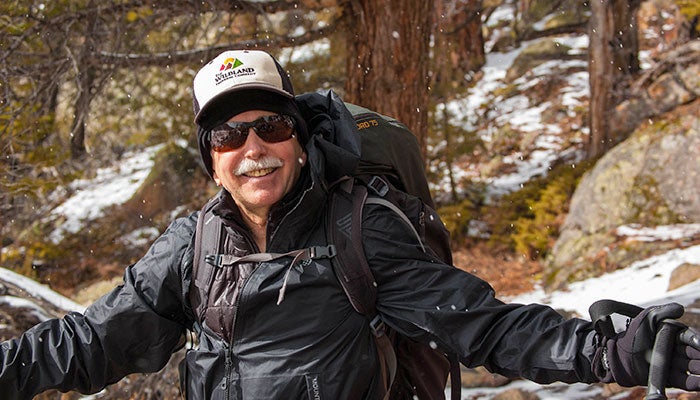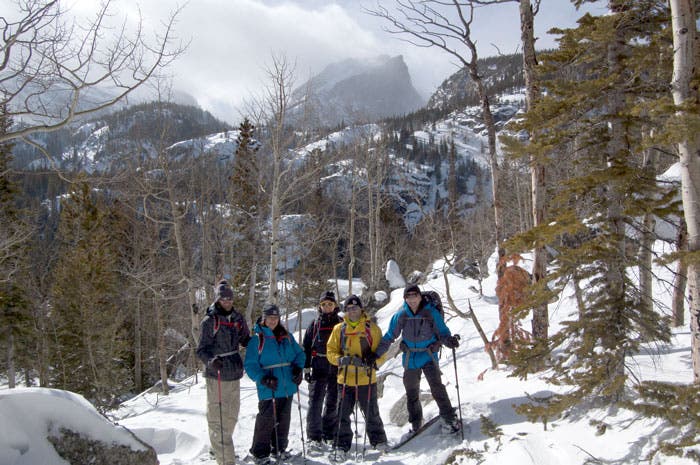A Trail Guide's Insight to the Colorado Rocky Mountains in Winter

'Alex Cernichiari'
After spending four days snowshoeing with Robin and Wildland Trekking, former National Park Trips Media staffer Alex Cernichiari took a few minutes to find out why he loves what he does.
Why do you lead winter trips in Rocky Mountain National Park?
My trips with Wildland Trekking, no matter the season, give me time with guests who often become friends. Immersion in wild country allows us to live in the moment, and in winter, those moments include great solitude, views of the high peaks draped in snow and the freedom snowshoes give us to travel off the beaten path.
What might surprise people about Rocky Mountain National Park in winter?
Two things. One is solitude, the chance to travel to frozen backcountry waterfalls or to the base of one of Rocky’s glaciers or high lakes, often with just your fellow travelers – that sense of having the mountain largely to yourself and your companions is very special.
The second is the diversity of the winter experience here: treks among the high peaks, along snow-covered rivers, in deep forest where our snowshoes allow us to float along on a four or six-foot base of snow and even options for hikes in warmer valleys where mountain views surround us.
What’s your favorite thing about Rocky in winter?
Goodness, I suppose it might be how clean and fresh the country feels; whether windswept tundra or more sheltered subalpine forest. High country winter air is crystalline and pure.
Why should people visit Rocky Mountain National Park and see or travel to the high alpine areas?
You can find something here you might not even have been looking for in these mountains: the challenge of a hike above tree line, learning to snowshoe, taking your skills to the next level or just being so present in the moment as a herd of elk pass in the meadow before you.

You’ve spent a lifetime working in the outdoors. What keeps you going outside?
All these things I’ve touched on. I like to say the mountains pull you up. I suppose I mean this in many different ways.
You used to work for the National Park Service. How has working for the park service shaped your guiding?
That is a really good question. National parks, particularly the wilderness within them, allows us to challenge ourselves individually and to contemplate and reflect in very personal and powerful ways.
In my time as a backcountry ranger, I was privileged to help enable this experience for others and I work to do so now in my guiding.
You’re originally from the Great Smoky Mountains area. What brought you to Boulder and Estes Park?
Open sky, distance and the sense of place that I feel in the American West brought me here.
If you could tell someone to visit one place where you’ve guided or worked, where would it be?
The Stormy Peaks, a remote area in the northeastern portion of Rocky Mountain National Park. As you leave the spruce-fir forest behind and enter the alpine tundra near the peaks, the world falls away before you with nothing but mountains upon mountains to the horizon.
What are the 3 essentials in your pack for traveling in the national parks in winter?
Only three? Well ok here are some critical items for winter travel at altitude.
1. More high-energy food/electrolytes and water than you think you’ll need. It’s great insurance for keeping you, and maybe your companions, strong in the face of changing weather or fatigue.
2. Extra clothing, particularly for your head/face and hands. I know there’s a theme here,but having just one more layer or energy bar can really help.
3. I’m going to cheat a little and throw in a number of absolute essentials that no backcountry traveler, no matter the place or season, should be without:
- A well-equipped first-aid kit and the knowledge for using it effectively.
- A map, compass, trusted navigation aids and experience in their use.
- Finally, I try to put a huge dose of humility in my pack: I’m prepared to turn back or to change my plans if conditions require that. There is always another path, another day, another adventure.
For more information about guided hiking trips in Yellowstone and other places around the world, contact Wildland Trekking at800-715-4453, International 927-379-6383, www.wildlandtrekking.com